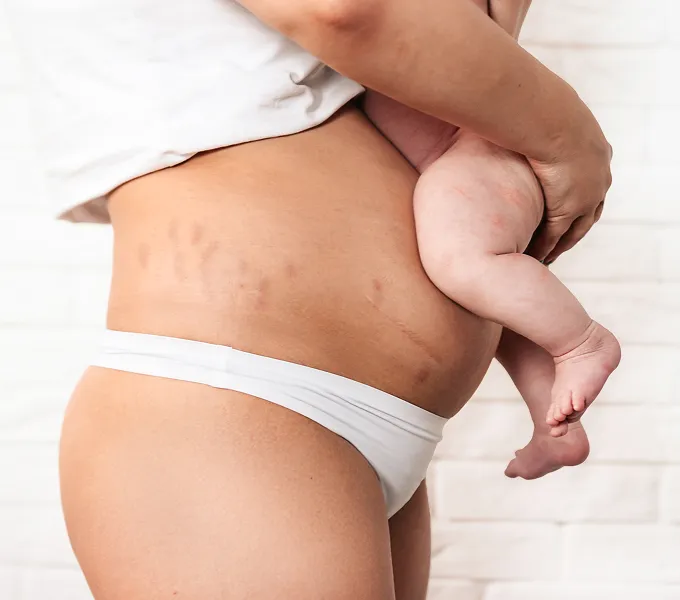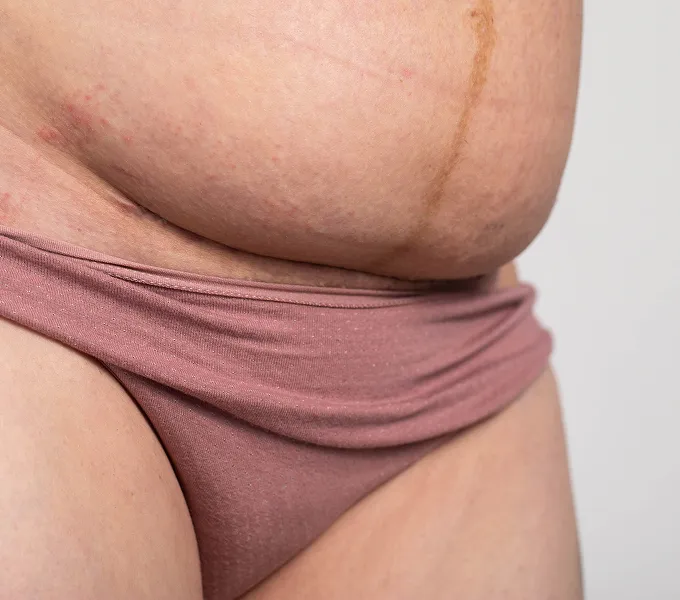
Is It Normal for My C-section Scar to Hurt or Itch Years Later?
There’s an annoying little side-effect of having a cesarean section birth that no one is likely to have told you about — your scar can bother you, even years after you've given birth. If your c-section scar is currently aching or itching, you're probably wondering if it's normal. In a word, the answer is no. “It's very common for cesarean scars to itch or hurt years later, but that doesn’t mean that it’s normal,” says Dr. Ashley Rawlins, PT, DPT. Normal implies healthy and functioning well. If you're bothered by your scar, all is not well — and you can definitely do something about it.
Keep reading to find out why your scar may itch or hurt long after your delivery day, and what you can do to relieve the discomfort.
Why does my cesarean scar itch or hurt years later?
Research shows that pain or itching at scar sites is certainly common and that the symptoms are often considered severe and can persist over a prolonged period of time after a wound has healed. Studies show that this chronic pain or itching could also be a result of peripheral and central nervous system changes, which are similar to the changes that occur in other types of chronic pain.
While the mechanisms behind the development of chronic itch after cesarean are even less understood than those behind chronic pain, recent research suggests that any type of chronic itch, in general, develops through the same means: There are changes in your nerves and brain which generate, amplify, and maintain a sensation of itch.
"Pain and itching can occur for any number of reasons after a cesarean," says Rawlins. "The exact cause is not always easy to pinpoint and is likely to be a little different for each person." In general, the causes of pain and itching can be related to conditions of the skin and/or scar itself, changes in your nervous system, or even be related to a psychiatric condition.
Rawlins explains that, during the early stages of wound healing, it is normal to experience pain and itching which should improve as you heal. With the inflammation that occurs during early wound healing, the body releases chemicals including histamines which can contribute to the sensation of itching.
If there is any disruption in the healing process, like re-injury or even poor nutrition, inflammation can persist and even lead to abnormal or delayed wound healing, excessive scar tissue, or adhesions (when scar tissue joins places in the body together that normally shouldn't be together), which can all increase the chance of your symptoms becoming chronic.
Itching and pain can also come from pulling of the skin and tissues surrounding the scar, or even from excessive scar tissue that may irritate the nerves in the surrounding area.
What can I do to stop c-section scar pain and itching?
Very few people realize that physical therapy can help you retrain and unwind changes that occur in your central nervous system. If you still have itching and pain years after having a c-section, physical therapy is a great option to help improve your symptoms, and importantly it doesn’t involve more surgery or medication. One study found a reduction in pain for subjects who had c-sections six to nine years prior, after treating their symptoms with myofascial scar release techniques used in physical thearpy.
It's best to also discuss your symptoms with your primary care provider. Depending on how severe and long-lasting your symptoms, they can discuss other possible treatment options.
Is there a way to prevent c-section and scar pain and itching?
Preventing scar pain and itching will ideally begin with proper wound care following surgery. You want to protect the wound and follow your doctor's directions carefully to encourage the healing process to occur as normally as possible. Alas, that's easier said than done when you have a newborn to take care of. If you weren't able to give your wound TLC after childbirth, you're not alone!
Working with a pelvic floor physical therapist after a c-section is also optimal, if you can. A PT can teach you manual therapy to help with scar tissue and deeper wound healing. They can also recommend specific exercises that support recovery after a cesarean.
Last but not least, one of the most helpful benefits of working with PT is that they'll teach you how to perform c-section scar massage, which can further aid in healing and scar tissue remodeling — all of which can reduce your chances of future pain and itching. They'll also help you find ways to effectively calm your symptoms such as heat, ice, or transcutaneous electrical nerve stimulation (TENS).
Don't Wait to Address Cesarean Scar Pain & Itching
Prolonged cesarean scar pain or itching is no doubt frustrating, but it can also become so significant that it impacts the way you feel and interact in your day-to-day life. You might find that you feel differently about your body, that you avoid wearing certain clothing, have trouble sleeping, or avoid activities that might make the itching or pain worse. Your c-section scar doesn't have to slow you down or take away from your happiness.
Reach out to your healthcare provider today. Better yet, schedule an evaluation with one of our pelvic floor physical therapists today. They will use their specialized training to treat your post-cesarean scar symptoms, no matter how long ago you had a cesarean birth.




